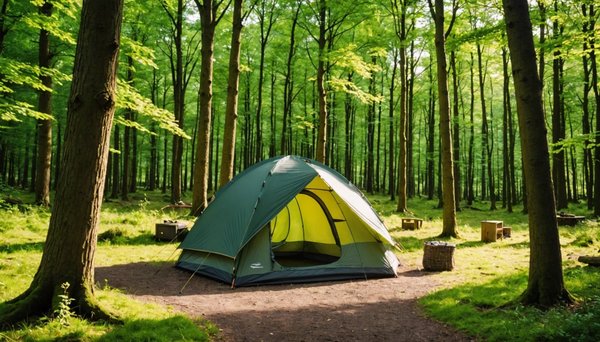Finding Top Eco-Friendly Campsites in the UK
Explore greener getaways with diverse options across the nation
The UK offers numerous eco campsites that combine natural beauty with environmental responsibility. For travelers seeking sustainable campsites, the focus often lies on minimizing ecological impact through renewable energy, waste reduction, and preserving local wildlife habitats.
Among the best green camping locations, you’ll find sites offering composting toilets, solar power, and strict recycling policies. These amenities not only reduce carbon footprints but also ensure that campers enjoy pristine natural surroundings. Some eco campsites integrate organically managed farmland or woodlands, enriching the experience with biodiversity and promoting local ecosystems.
England’s green camping spots may include woodland glens and coastal areas powered by solar energy. Scotland’s sustainable campsites often emphasize moorland conservation, while Wales features sites with community-led waste reduction initiatives. Northern Ireland hosts eco campsites that blend rugged landscapes with off-grid utilities, catering to those prioritizing minimal environmental disturbance.
Locating an eco campsite that aligns with your values enriches your outdoor experience and contributes to a larger sustainability effort. When choosing from eco campsites UK-wide, prioritize those demonstrating clear green credentials and transparent stewardship of their land.
Essential Green Camping Practices
Adopting eco-friendly camping tips is crucial for preserving natural spaces. The foundation of low-impact camping lies in minimizing human influence on the environment. This begins with following green camping guidelines such as staying on marked trails to prevent soil erosion and protect plant life.
When it comes to waste, always practice the principle of “pack it in, pack it out.” This means carrying out all trash, including food scraps, to avoid disrupting local ecosystems. Recycling where possible helps ensure materials aren’t left to pollute nature.
Resource use should be judicious. Use water sparingly and opt for biodegradable soaps to protect aquatic environments. Avoid generating excessive noise or light that could disturb wildlife, respecting their habitats.
Following these eco-friendly camping tips not only conserves nature but enhances your outdoor experience by maintaining pristine surroundings. By embracing established green camping guidelines, every camper contributes to sustainable recreation that safeguards the planet for future adventurers.
Sustainable Camping Accommodation Options
When considering eco lodges UK and glamping sustainable options, it’s clear these choices offer a fresh take on camping. Eco lodges often feature eco-friendly construction materials and low-impact utilities, ensuring minimal environmental disruption. Meanwhile, green cabins typically utilize renewable energy sources and water-saving technologies, making them a responsible choice for nature lovers.
Opting for green-certified accommodation or off-grid facilities comes with several benefits. First, these options drastically reduce carbon footprints through energy efficiency and waste reduction. Second, they provide a comfortable experience with modern amenities, bridging the gap between traditional camping and more luxurious stays. This means you can enjoy nature without sacrificing convenience or sustainability.
Traditional tent camping, although authentic, lacks many of the eco-efficiencies found in sustainable options. For example, tents do not usually contribute to energy savings or water conservation. In contrast, glamping sustainable options like pods are designed to minimize waste and support local biodiversity. This makes them an excellent alternative for those seeking an environmentally conscious retreat with a touch of luxury.
Choosing any of these green accommodations supports conservation efforts and promotes a more mindful interaction with our environment.
Minimising Environmental Impact While Camping
Making camping adventures eco-friendly benefits nature and future trips.
Minimal impact camping starts with thoughtful preparation. Pack lightweight, reusable gear to reduce waste and avoid single-use plastics, which can harm delicate ecosystems. Use biodegradable soaps and carry out all non-organic waste. When setting up your campsite, stick to established pitches to protect native flora and prevent soil erosion.
Following the Leave No Trace UK principles means respecting wildlife, staying on marked trails, and disposing of waste responsibly. Campfires should be minimal or avoided where prohibited to reduce the risk of forest fires and damage to soil microorganisms. Always extinguish fires completely.
Travel choices profoundly affect your trip’s footprint. Opt for sustainable travel habits by carpooling, cycling, or using public transport to reach campsites whenever possible. This reduces carbon emissions and lessens congestion, helping protect sensitive national parks and countryside. Embracing these habits supports a harmonious balance between enjoying the outdoors and conserving it for others.
Booking, Reviews, and Resources for Eco-Camping
When planning your trip, booking eco campsites UK requires thorough research to ensure the site meets genuine sustainability criteria. Prioritize campsites listed on reputable platforms specializing in green camping. These sites often verify eco-friendly practices, such as renewable energy use and waste reduction measures, offering peace of mind for environmentally conscious travelers.
To find honest UK camping reviews, focus on platforms that encourage detailed feedback from past visitors. Look for mentions of how well campsites uphold their ecological claims and how friendly the staff is towards environmental measures. Such reviews highlight real experiences, helping you avoid greenwashing and make informed decisions.
Official green camping resources are invaluable for both beginners and seasoned campers. Organisations dedicated to sustainable tourism provide guidelines on low-impact camping, preserving natural habitats, and respecting local ecosystems. Their websites often include resources like checklists and best practice tips. These materials help campers minimize their carbon footprint while enjoying the outdoors responsibly.
Using these combined approaches — responsible booking, trusted UK camping reviews, and authoritative resources — ensures a rewarding eco-camping experience that truly supports conservation efforts.
